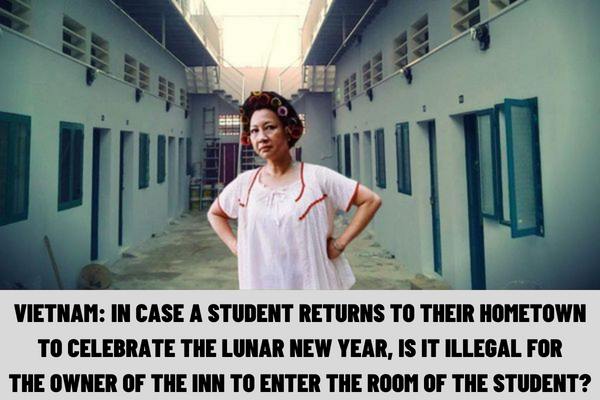Vietnam: In case a student returns to their hometown to celebrate the Lunar New Year, is it illegal for the owner of the inn to enter the room of the student?
Do students who rent an inn need to conclude an agreement?
In essence, renting a house is the same as renting a house, so based on Article 121 of the 2014 Law on Housing of Vietnam stipulating as follows:
Housing agreement in Vietnam
A housing agreement in Vietnam shall be concluded by contracting parties and made in writing, including:
1. Full names of individuals, names of organizations and addresses of contracting parties;
2. Description of characteristics of the house and the piece of land attached to that house. Regarding agreements on apartment sale or lease purchase, contracting parties must state the common areas or common-using areas; private areas; floor area; purposes of the common areas or common-using areas in the apartment building according to approved design;
3. The value of contributed capital, the transaction price of housing if there is a term on pricing in the agreement; regarding transactions in housing sale, lease, or lease purchase which is regulated pricing by the State, contracting parties shall comply with that regulations;
4. Deadline for and method of payment regarding transactions in housing sale, lease, lease purchase or transfer of agreements on housing sale;
5. Deadline for housing transfer; housing warranty duration regarding transactions in buying or renting and buying new house; terms of agreements on housing lease, lease purchase, mortgage, lending, permission for stay, authorization of housing management; deadline for capital contribution;
6. Rights and obligations of contracting parties;
7. Commitments of contracting parties;
8. Other agreements;
9. Effective date of the agreement;
10. Date of agreement;
11. Signatures and full names of contracting parties, or stamps (if any) and positions of the signatories regarding organizations.
Thus, a housing agreement shall be concluded by contracting parties and made in writing including the above contents.

Vietnam: In case a student returns to their hometown to celebrate the Lunar New Year, is it illegal for the owner of the inn to enter the room of the student? (Image from the Internet)
Does the housing agreement need to be notarized or authenticated?
Pursuant to the provisions of Article 122 of the 2014 Law on Housing of Vietnam:
Notarization and authentication of agreements and effective date of housing agreements
1. Regarding agreements on housing sale, giving, exchange, capital contribution, mortgage, or transfer of agreement on commercial housing sale, it is required to notarize or authenticate the agreement, except for cases prescribed in Clause 2 of this Article.
Regarding any agreement prescribed in this Clause, the effective date of the agreement shall be the date on which the agreement is notarized or authenticated.
2. Regarding transactions in giving houses of gratitude; sale or lease purchase of state-owned housing; sale or lease purchase of social housing, housing serving the relocation; contributed housing which one entity of contracting parties is an organization; housing lease, lending, permission for stay, or authorization of housing management, it is not required to notarize or authenticate the agreement, unless contracting parties wish to notarize or authenticate the agreement.
Regarding any agreement prescribed in this Clause, the effective date of the agreement shall be agreed by contracting parties; if the contracting parties do not agree, the effective date of agreement shall be the date on which the agreement is signed.
3. The documents on housing inheritance must be notarized or authenticated as prescribed in law on civil.
4. The notarization of housing agreement must be carried out at a notary; the authentication of housing agreement must be carried out at the People’s Committee of the commune where the house is located.
Thus, the agreement of a house or inn is not required to be notarized or authenticated. The parties may voluntarily request notarization or authentication.
In case a student returns to their hometown to celebrate the Lunar New Year, is it illegal for the owner of the inn to enter the room of the student?
Pursuant to Article 22 of the 2013 Constitution of Vietnam stipulating as follows:
Article 22.
1. Every citizen has the right to a legal residence.
2. Everyone has the right to inviolability of his or her home. No one may enter the home of another person without his or her consent.
3. The search of homes shall be prescribed by a law.
Thus, arbitrarily entering the accommodation is considered an act of violating another's illegal residence. Even if a tenant goes home to celebrate the Lunar New Year for a long time or for any other reason, the landlord does not have a valid reason to enter the room on his own, it is considered a violation of the law.
In case a student returns home to celebrate the Lunar New Year, the owner of the inn voluntarily entering the room may also be prosecuted for penal liability according to Clause 1, Article 158 of the 2015 Criminal Code of Vietnam (amended by Clause 31, Article 1 of the 2017 Law on amendments to the Criminal Code of Vietnam):
Home infringement
1. A person who commits any of the following acts shall face a penalty of up to 02 years' community sentence or 03 - 24 months' imprisonment:
a) Illegally searching another person's home;
b) Illegally evict a person from his/her home;
c) Illegally occupying a home or obstructing its lawful residents or managers from entering their home;
d) Invading a person’s home.
Thus, if a student returns to their hometown to celebrate the Lunar New Year, it is illegal for the landlord to voluntarily enter the tenant's room. The landlord who commits the above act may be prosecuted for criminal liability according to above regulations.
LawNet
